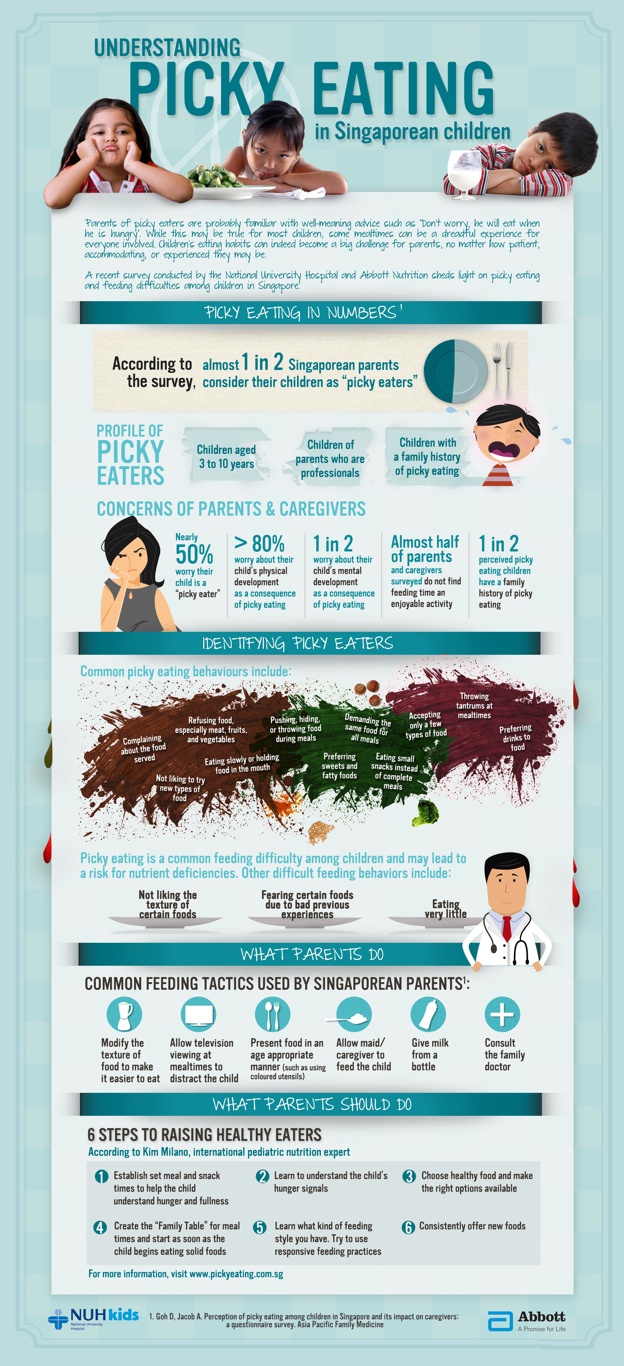SingaporeMotherhood | Preschooler & Up
December 2012
Get your Picky Eater to Eat!

Are you a picky eater? Then your child may be one as well, says Associate Professor Daniel Goh, Head of the Paediatric Department at the National University Hospital, as studies have shown that children with a family history of picky eating are more likely to be picky eaters themselves.
But while picky eaters feed on little, their numbers are large. The first-ever Asian study on picky eating and feeding difficulties among children aged one to 10 years in Singapore earlier this year revealed that almost half of the 407 parents surveyed considered their child to be a picky eater.
[banner][/banner]
Picky Eating Behaviours
- Complains about what is served
- Refuses food especially vegetables/fruits
- Refuses food like meats
- Pushes, hides or throws food during mealtimes
- Eats the same food for all the meals
- Accepts only a few types of food
- Does not like to try new food
- Eats slowly or holds food in the mouth
- Eats sweets and fatty foods instead of healthy foods
- Eats snacks instead of meals
- Throws tantrums at mealtimes
- Prefers drinks to food
The study, conducted by The Department of Paediatrics, National University Hospital (NUH) and Abbott Nutrition, also found that dealing with picky eaters led their parents and caregivers to suffer stress and anxiety.
Picky eating may not seem like a major problem when there are other often more pressing issues to deal with. However, ignoring this problem will not make it go away, and can in fact be detrimental to your child’s physical and mental health.
A study has found that Mental Development Index (MDI) scores of picky eaters aged one to three years were 14 points lower than those of healthy eaters.
The experts — Associate Professor Daniel Goh, Head of Paediatric Department, National University Hospital, Ms Ng Siau Hwei, Clinical Psychologist, Department of Paediatrics, National University Hospital, and Ms Charlotte Lin, Dietitian, National University Hospital — tell us more.
How does a child become a picky eater?
Prof Daniel Goh:
The causes of picky eating are multi-faceted. There may be genetic as well as environmental factors that impact the problem. Studies have shown that children with a family history of picky eating are more likely to be picky eaters themselves. It is however important to note that to date there is no evidence to suggest that parents who are very selective in their child’s intake actually cause this problem.
Ms Ng Siau Hwei:
There are also psychological factors such as a struggle for autonomy, changing emotions and moods, and the level of affection or adverse interaction between mother and child. Peer influence and the example set by parents during mealtimes within the family could also affect children’s eating behaviours and habits.
Which age group has the highest number of picky eaters?
Prof Daniel Goh:
In the study conducted by Department of Paediatrics, National University Hospital (NUH) and Abbott Nutrition, older children aged between three and 10 years were more likely to be picky eaters, according to their parents.
Do kids eventually outgrow picky eating?
Prof Daniel Goh:
Picky eating, if not managed effectively, can lead to nutritional deficiencies as well as create stress in the family relationship especially at mealtimes. These can have a far-reaching impact on the child and the family. It is therefore unwise to leave this problem unchecked in the hope that it is go away on its own.
It is advisable for parents to seek professional help early to rule out any underlying medical condition and also to ensure that their kids obtain the optimal nutrients required for growth and development.
Should picky eaters be given supplements?
Ms Charlotte Lin:
Modification of dietary habits, patterns and portions would be the first line nutritional intervention to ensure that picky eaters receive adequate calories and protein to grow well. These strategies are more practical and sustainable in the long run. Nutritional supplements are often expensive and some children tire of drinking the same supplement day after day.
Is there any real health threat to a child who is a picky eater?
Prof Daniel Goh:
I would not go to the extent to say that there is ‘danger’ involved if a child is a picky eater. However, there are potential health threats such as nutrient deficiencies or inappropriate balance of nutrients in the diet of a child.
Some children may consume adequate calories, but the diet may be insufficient in vital nutrients. Poor eating habits developed in childhood may also carry through into adult life. Over time, this may impact growth and development. and may be associated with increased risk for the development of chronic lifestyle diseases such as diabetes and heart disease.
According to a recent study conducted by Department of Paediatrics, National University Hospital (NUH) and Abbott Nutrition, respondents who thought their child was a picky eater also tend to perceive the child as less energetic or healthy. Nearly half the respondents reported that they were ‘very much concerned’ that their child was a picky eater. They were also worried about their child’s physical and mental development.
Picky eating may also negatively affect cognitive development in young children. A study found that Mental Development Index (MDI) scores of picky eaters one to three years old were 14 points lower than those of healthy eaters.
How can I tell if my child’s bad eating habits are affecting him/her in a negative way?
Prof Daniel Goh:
The key to managing this problem is to pick it up early and manage promptly and appropriately. If your child exhibits the features of picky eating, do discuss it with your family doctor who will be able to assist you in assessing your child and provide advice on appropriate measures to take. Do not wait till your child is not growing well before seeking help.
All content from this article, including images, cannot be reproduced without credits or written permission from SingaporeMotherhood.
Follow us on Facebook, Instagram, and Telegram for the latest article and promotion updates.






